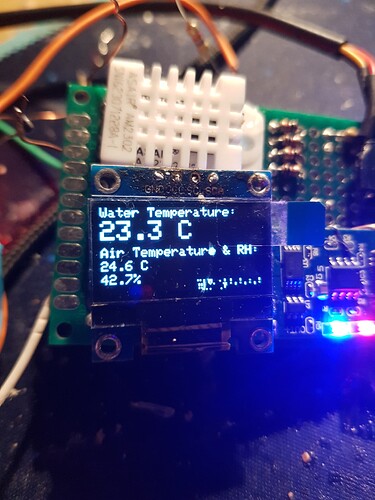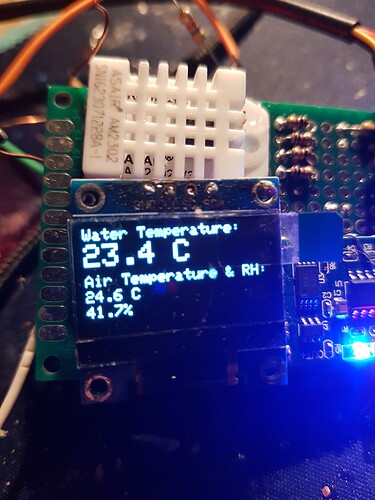This is my SSD1306 oled it's showing trash pixels in the corner of the screen. Is there any way to fix it ?
The two pictures show that the screen stops showing the trash for a few seconds but then shows the trash.
Also the Adafruit (i am using Adafruit SSD1306 library) oled demo test example works fine. I've also noticed that the pixels on the corner change when other stuff updates on the screen , so i'm shure they are ASCII or other data forced on the screen.
Also here's the sketch
#include <Wire.h>
#include <Adafruit_GFX.h>
#include <Adafruit_SSD1306.h>
#include <OneWire.h>
#include <DallasTemperature.h>
#include <DHT.h>
const int SensorDataPin = 2;
const int DHT22Pin = 3;
OneWire oneWire(SensorDataPin);
DallasTemperature sensors(&oneWire);
DHT dht(DHT22Pin, DHT22);
Adafruit_SSD1306 display(128, 64, &Wire, -1);
void setup() {
Serial.begin(9600);
if (!display.begin(SSD1306_SWITCHCAPVCC, 0x3C)) {
Serial.println(F("SSD1306 allocation failed"));
for (;;)
;
}
delay(1);
display.clearDisplay();
display.setTextColor(WHITE);
dht.begin();
}
void clearLastLine() {
display.setTextSize(1);
display.setCursor(0, 60);
display.print(""); // Clear the last line
}
void displayTemperatureAndHumidity(float waterTemp, float airTemp, float humidity) {
display.setTextSize(1);
display.setCursor(0, 0);
display.print("Water Temperature: ");
display.setTextSize(2);
display.setCursor(0, 10);
display.print(waterTemp, 1); // Use print with precision to avoid extra decimal places
display.print(" C");
display.setTextSize(1);
display.setCursor(0, 30);
display.print("Air Temperature & RH: ");
display.setTextSize(1);
display.setCursor(0, 40);
display.print(airTemp, 1); // Use print with precision to avoid extra decimal places
display.print(" C");
display.setTextSize(1);
display.setCursor(0, 50);
display.print(humidity, 1); // Use print with precision to avoid extra decimal places
display.print("%");
// Scrolling long text
String longText = "";
int charWidth = 6; // Assuming a fixed width for characters (adjust as needed)
int textWidth = display.getCursorX() + (longText.length() * charWidth);
if (textWidth > display.width()) {
static int scrollPosition = 0;
display.setTextSize(1);
display.setCursor(0 - scrollPosition, 60);
display.print(longText);
scrollPosition = (scrollPosition + 1) % textWidth;
} else {
display.setTextSize(1);
display.setCursor(0, 60);
display.print(longText);
}
}
void loop() {
display.clearDisplay();
sensors.requestTemperatures();
float waterTemperature_Celsius = sensors.getTempCByIndex(0);
float airHumidity = dht.readHumidity();
float airTemperature_Celsius = dht.readTemperature();
Serial.print("Water Temperature = ");
Serial.print(waterTemperature_Celsius);
Serial.println(" C");
Serial.print("Air Humidity = ");
Serial.print(airHumidity);
Serial.println(" %");
Serial.print("Air Temperature = ");
Serial.print(airTemperature_Celsius);
Serial.println(" C");
displayTemperatureAndHumidity(waterTemperature_Celsius, airTemperature_Celsius, airHumidity);
clearLastLine();
display.display();
// Adjust the delay or use non-blocking delay methods based on your requirements
delay(1);
}
`#include <Wire.h>
#include <Adafruit_GFX.h>
#include <Adafruit_SSD1306.h>
#include <OneWire.h>
#include <DallasTemperature.h>
#include <DHT.h>
const int SensorDataPin = 2; // DS18B20 Pin
const int DHT22Pin = 3; // DHT22 Pin
OneWire oneWire(SensorDataPin);
DallasTemperature sensors(&oneWire);
DHT dht(DHT22Pin, DHT22);
Adafruit_SSD1306 display(128, 64, &Wire, -1); // Display size
void setup() {
Serial.begin(9600); // Serial monitor baud rate
if (!display.begin(SSD1306_SWITCHCAPVCC, 0x3C)) { // Oled addres (change to actual oled addres for project to work)
Serial.println(F("SSD1306 allocation failed"));
for (;;)
;
}
delay(1);
display.clearDisplay();
display.setTextColor(WHITE); // Text color (may not change the real oled color if oled does not support feature)
dht.begin();
}
// Water temperature display
void displayTemperatureAndHumidity(float waterTemp, float airTemp, float humidity) {
display.setTextSize(1);
display.setCursor(0, 0);
display.print(F("Water Temperature: "));
display.setTextSize(2);
display.setCursor(0, 10);
char waterTempStr[10];
dtostrf(waterTemp, 4, 1, waterTempStr);
display.print(waterTempStr);
display.print(F(" C"));
// Air temperature & RH display
display.setTextSize(1);
display.setCursor(0, 30);
display.print(F("Air Temperature & RH: "));
display.setTextSize(1);
display.setCursor(0, 40);
char airTempStr[10];
dtostrf(airTemp, 4, 1, airTempStr);
display.print(airTempStr);
display.print(F(" C"));
display.setTextSize(1);
display.setCursor(0, 50);
char humidityStr[10];
dtostrf(humidity, 4, 1, humidityStr);
display.print(humidityStr);
display.print(F("%"));
}
void loop() {
display.clearDisplay();
sensors.requestTemperatures();
float waterTemperature_Celsius = sensors.getTempCByIndex(0);
float airHumidity = dht.readHumidity();
float airTemperature_Celsius = dht.readTemperature();
// Serial print of all sensor readings
Serial.print(F("Water Temperature = "));
Serial.print(waterTemperature_Celsius);
Serial.println(F(" C"));
Serial.print(F("Air Humidity = "));
Serial.print(airHumidity);
Serial.println(F(" %"));
Serial.print(F("Air Temperature = "));
Serial.print(airTemperature_Celsius);
Serial.println(F(" C"));
display.display()`
This is the new and updated sketch!

